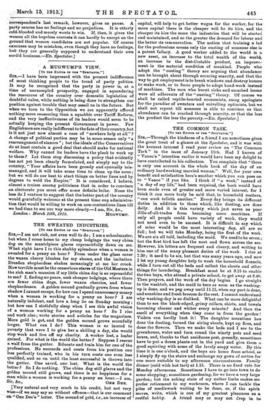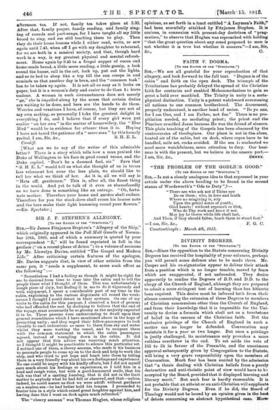THE COMMON TASK.
[To THE EDITOR OF THE " SPECTATOR."] SIR,—Through the kindness of a friend I am sometimes given the great treat of a glance at the Spectator, and it was with the keenest interest I read your review on " The Common Tark " in the issue of January 11th. Had I known of " Vanoc's " intention earlier it would bare been my delight to have contributed to his collection. You complain that "there is only one account in the whole book of the day of an ordinary hardworking married woman." Well, for your own benefit and satisfaction here's another which you can pass on to " Vanoc " if you like. I think if " a week," instead of " a day of my life," had been required, the book would have been made even of greater and more varied interest, for I think it can more truly be said that, in household matters, " one week telleth another." Every day brings its different duties in addition to those which, like dusting, are done daily. And it is this variety which just saves us poor Jills-of-all-trades from becoming mere machines. If only all people could have variety of work, they would not need even to be amused. It is difficult to say which of mine would be the most interesting day, all are so full ; but we will take Monday, being the first of the week. We are six all told, including the maid. We used to be seven ; but the first bird has left the nest and flown across the sea. However, his letters are frequent and cheery, and writing to him one of the many pleasant duties of the week. I rise at 7.30 ; it used to he six, but that was many years ago, and now I let my young daughter help to wash the household flannels, while I turn out all the beds and collect the sheets and other things for laundering. Breakfast must be at 8.15 to enable the two boys, Who attend a private school, to get away at 8.40. Then prayers, and the work of the day begins. I go straight to the washtub, and the maid to hers as soon as the washing- up is done, and we peg away until 11.15, when my part is done, and sunshine and fresh breezes do the rest. I cannot understand why washing-day is so disliked. What can be more delightful than to see the black-edged, grimy collars, shirts, and towels becoming cleaner and whiter every minute? And then the smell of eve,rything when they come in from the garden ! Violets can hardly beat it ! The daughter meantime has done the dusting, turned the airing sheets, kept up fires, and done the flowers. Then we make the beds and I see to the greenhouse, water and turn round the ninety pots and seed boxes, and, thanks to that assiduous pest, greenfly, sometimes have to put a dozen plants out in the yard and give them a good squirting with some of the lovely soapy water. By this time it is one o'clock, and the boys are home from school, so I simply fly up the stairs and exchange my gown of cotton for one more suitable to my afternoon circumstances. Family dinner (cold with hot tart) at 1.15. There is no fixed rule for Monday afternoons. Sometimes I have to go into town to do some shopping; sometimes gardening, for we have.a very large garden; but the aching state of my nether limbs makes me prefer retirement to my workroom, where I can tackle the piles of needlework waiting to be done, or, if the spirit. moves, write, which is one of my greatest pleasures as a restful hobby. A friend may or may not drop in to afternoon. tea. If not, family tea takes place at .5.30. After that, family prayer, family reading, and family sing- ing of rounds and part-songs, for I have taught, all my little brood to sing, and am still teaching thorn to play. Then they do theinhome lessons while I either read, write, or sew again until 7.45, when off I go with my daughter to rehearsal, for. we are both in a musical society, and that, though, hard work in a way, is my greatest physical and mental refresh- ment. Home again by 9.45 to a frugal supper of cocoa and home-made bread, a little more reading, a little. gossip, a look round the house, call in the cat, lock up, put out the lights, and so to bed to sleep like a top till the sun creeps in and reminds us that another day is born, and the "common task" has to be taken up again. It is not all so easy as it looks on paper, but it is a woman's duty and easier to do than t.) leave undone. A woman in such circumstances does., not merely "go," she is impelled along by the sense that certain duties are waiting to be done, and hers are the hands to do them: Worries and vexations I bare, of course, but they are not of my own making, as personally I take the- greatest delight in everything I do, and I believe that if every girl were put earlier "on her own" in the matter of housewifery, the "Blue Bird" would be in evidence far oftener than it is. Hoping I have not taxed the patience of a'" mere Mau" by this homely [What are we to say of the writer of this admirable letter ? There is a story which tells bow a. man praised the Duke of Wellington to his face in good round terms, and the Duke replied, "Don't be a damned fool, sir." Save that "S. H. E. L." would tell us what she thought of us .in terms less vehement but none the less plain, we should like to tell her what we think of her. As it is, all we will say. is "Hats off, gentlemen." This is, after all, the finest thing in the world. And yet to talk of it even as shamefacedly as we have done is something like an outrage. " Oh, fortu- nate mother. Therefore your home and garden shall endure. Tberefore for you the stock-clove shall croon his hoarse note and the bees make their light humming round your lowers." —ED. Spectator.















































 Previous page
Previous page